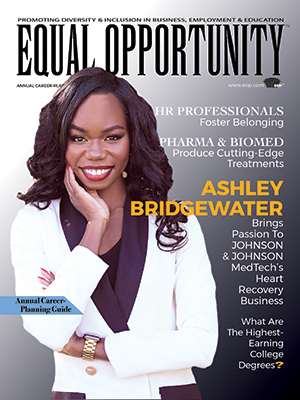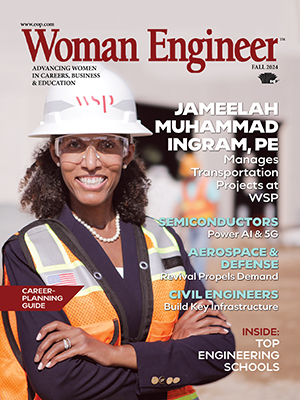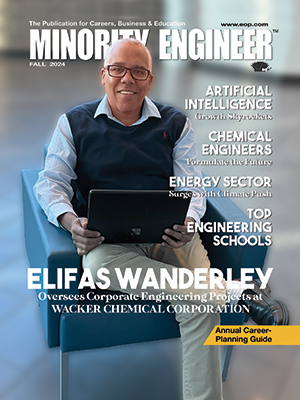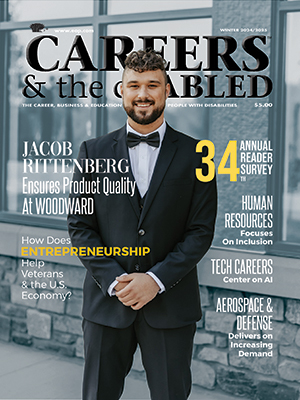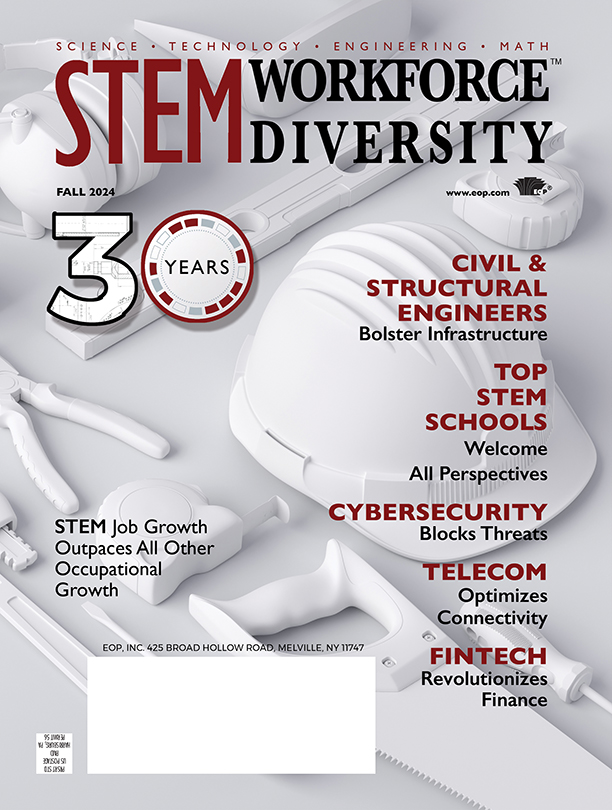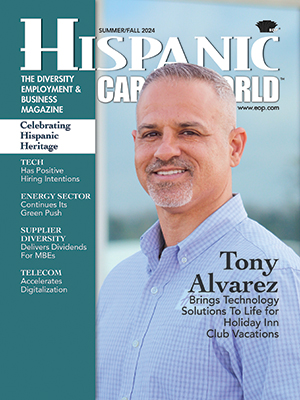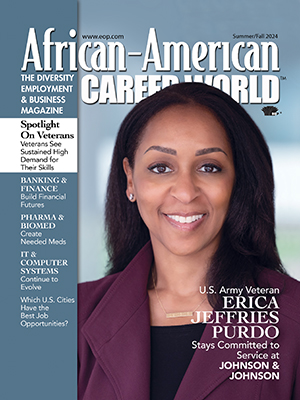By Amanda N. Wegner
Engineers are helping their companies in the high-demand semiconductor/consumer electronics industry conduct brisk business in this scintillating sector that’s not slowing down any time soon.
Hernandez Brings Thermal-Mechanical Modeling Expertise to Qorvo
An expert in thermal-mechanical modeling, Mercedes Hernandez works as a staff development engineer in a group that delivers this expertise to numerous Qorvo products and technologies.
“I provide crucial support in areas such as two to three years out pathfinding, research and development, assembly, test, and quality and reliability,” she details.
Hernandez’s work is oriented toward assuring high product performance, durability and strength. In semiconductors/microelectronics, one defect that can occur is warpage, which is caused by the cumulative thermal stress that occurs during manufacturing and assembly.
“If not controlled, then warpage can be very detrimental to our products,” explains Hernandez. “I’m currently using predictive modeling and working with the wafer fabrication team to quantify and avoid warpage during the assembly process.”
With Qorvo for almost 10 years, Hernandez loves the company’s fast pace and constant pursuit of innovation.
“We have solutions for many applications, ranging from wearables and home connectivity to space stations,” she shares. “Each project brings its own challenges, making Qorvo an ideal place to grow your career.”
Hernandez adds that what makes Qorvo a great place to work is its work environment, noting that while there are experts in many fields, there’s a common theme: everyone is willing to share their knowledge and collaborate.
“From lab visits and demos to a quick brush-up on concepts, you’ll always find someone to help you,” indicates Hernandez. “I also love being part of our Qorvo employee network groups designed to connect people and promote diversity, inclusion, personal, and professional development.”
Advice that Hernandez has received and likes to share is never to let self-doubt stop you from reaching your goals, and don’t let negative experiences from the past affect your decisions.
“The best thing we can do is examine the evidence behind those doubts. Consider the best- and worst-case scenarios. One little step at a time will make you increasingly more confident in your abilities.”
To best prepare for the field, she recommends maintaining your curiosity and willingness to learn. Don’t be afraid to say yes to new opportunities and projects, even if you don’t have all of the experience required.
“This is an excellent way to learn more skills and boost your career,” she adds.
Finally, don’t shy away from challenges. “Tough challenges will find us whether we want them or not,” says Hernandez.
“I try not to waste energy avoiding challenges because they are opportunities. They’re opportunities to experience fear, anxiety and even embarrassment. They also enhance my life and help to build my confidence and my ability to tolerate discomfort. I always remember the phrase, ‘Feel the fear and do it anyway!’”
Qorvo is headquartered in Greensboro, NC. Find career opportunities at qorvo.com/careers. Connect on Facebook, X, LinkedIn and YouTube.
Baca Helps Bring Next-Gen Analog Chips to Life at Texas Instruments
As a systems engineer at Texas Instruments (TI), Salvador (Sal) Baca works with next-generation analog chips and takes them from concept to mass production.
“I work directly with TI’s business units and customers to define product road maps, and assess and negotiate development trade-offs with design teams and customers,” details Baca. “My goal as a systems engineer is to create the best products that solve customer problems and meet their needs.”
He recently defined a new power management chip designed to enable industrial customers to develop more accurate, safe, compact and power-efficient factory equipment. The project “required collaboration with design, execution, and manufacturing teams in different countries to break through different levels of innovation and enable the product to meet the rigorous performance requirements,” indicates Baca, who began working at TI in 2015 as a product engineer intern.
“During my internship, I had great managers, coworkers, and mentors who were open to answering my questions, and who were willing to share their expertise and knowledge,” he recalls. “Having so many people willing to help me truly inspired my drive to work at TI. Today I hold myself accountable for helping as many people as possible, inspired by those who shared their knowledge with me.
While the reasons are many, Baca points to the opportunity to develop and grow in different directions as a key reason TI is regarded as a great place to work.
“A strong career isn’t composed of just vertical movement. Throughout different stages in our careers, we might need to perform in a completely different role or go deeper into a specific technology group to meet our goals. TI’s diversity of products and culture provides and empowers TIers to drive their careers in the direction needed for their development to continue to learn and grow.”
Early in Baca’s career, he followed the adage that if you work hard, then someone will notice. While he continues to work hard, a mentor challenged him on the “someone will notice” part of the saying.
“He emphasized I should own my career and set a clear goal of where I wanted to go. I took this personally because I struggled to share my career aspirations with my managers for fear of sounding arrogant,” he says.
“Since that conversation with my mentor, I’ve made it my goal to clearly communicate my career aspirations. Overall, this has helped me quickly identify a path to achieve my goals and secure development opportunities needed to get there,” he adds.
Baca also recognizes that, as a minority engineer, he brings a unique perspective to his work and the workplace.
“At TI, I’ve learned that my hobbies, culture, and interests all create a unique mix of factors that enable me to see things differently and share a distinct approach to problem-solving,” he concludes.
TI is headquartered in Dallas, TX. Find career opportunities at careers.ti.com. Connect on Instagram, Facebook, X, LinkedIn and YouTube.
Manley Diaz Leads a Team of Physical Engineers at Marvell
Marvell’s Harlina Manley Diaz wears two hats: she’s a principal physical design engineer and a senior staff manager. “I do technical work while managing a small team of engineers who also do physical design,” she explains.
In the application-specific integrated circuit (ASIC) world, physical design means taking a netlist or description of the design through a construction flow to output a physical layout that can be manufactured.
Recently, Manley Diaz worked on a five-nanometer processor chip, part of Marvell’s OCTEON family of data processing units used for advanced 5G radio access and transport processing.
With Marvell for 18 years now, Manley Diaz initially joined the company as part of its acquisition of the printer ASICs business of Avago Technologies.
“I’ve always enjoyed working at Marvell, but during the last four years or so since the global coronavirus (COVID-19) pandemic, I feel like the company culture has really solidified in a way that makes me even more excited to be here,” shares Manley Diaz.
“Work-wise, we’re at the leading edge of technology and doing interesting work in expanding markets. On the life side of things, our CEO Matt Murphy has put a lot of effort into making sure work-life balance is emphasized, as well as diversity and personal growth, and I feel like it’s made a positive difference in the culture.”
For career success, Manley Diaz shares advice she once received: advocate for yourself.
“You can sit at your desk and do the work, but, in the end, it’s best to be proactive in searching for opportunities to advance your knowledge and contributions,” she recommends. “This will leave you feeling more fulfilled in your job and open more doors for success.”
She also advises not to be afraid to ask questions. “As easy as it can be for old-timers to forget, we all started somewhere, and the more you learn from others, the quicker you’ll gain confidence and make an impact.”
Additionally, don’t hesitate to participate in technical conversations and advocate for yourself, according to Manley Diaz.
“As a minority engineer, it’s easy to get overlooked, particularly in group situations or environments with team collaboration. People tend to gravitate toward the person with whom they feel most comfortable, and that often tends to be the person who looks or sounds most like them,” she observes.
“It’s important to find ways to participate in the technical conversations and advocate for yourself so you can be recognized as a valued contributor. I’ve found making one-on-one connections can be helpful, especially when those connections can translate back into the group setting.”
Marvell is headquartered in Santa Clara, CA. Find career opportunities at marvell.com/company/careers.html. Connect on Facebook, X, YouTube and LinkedIn.
Moore Runs Avnet’s Business Analytics Program
As vice president of the Global Business Analytics Center of Excellence at Avnet, Rondekka (Ron) Moore leads a team of data scientists who solve business problems. “I support leaders and businesses by looking at their data and helping them make more informed decisions,” details Moore, who’s been with the company, which distributes electronic components, for almost 30 years.
“This falls into a few areas, such as where we might want to invest more resources to attack different customer segments, or where we might want to invest in more inventory because we see an opportunity to help the market and help our customers.”
Recently, Moore’s team has been working to adapt its forecasting models. Like other companies, Avnet’s forecasting models for sales and inventory have been impacted by the global coronavirus (COVID-19) pandemic, supply chain disruption, and other global events.
“You can imagine, it’s not just us, but everyone’s forecasting models are sort of blown up,” indicates Moore. “In terms of inventory, you can imagine that things have changed a little bit, especially with what’s going on with many companies in the semiconductor industry, which impacts our work. One area we’re focusing on today is understanding what inventory we should have and what inventory in which we want to invest more or less.”
An electrical engineer by training, Moore was first introduced to Avnet when he saw a chance to become a field application engineer, a role that supports other companies designing products.
“That’s what Avnet does,” explains Moore. “We send our engineers out on behalf of the major suppliers we work with in the world to help support their customers or as an extension of their design teams.”
He was especially attracted to this role because while he enjoyed design, he also enjoyed working with others, talking, and learning. Field application engineering was a chance to incorporate those aspects into his work.
“While I was in college at UC Berkeley, they didn’t talk about field application engineering as an area, but once I saw what it was all about, I really began to enjoy it,” he remembers, adding, “You see lots of new and different products from different companies.”
In addition to working with great people, Moore also appreciates Avnet because it’s allowed him to try different roles. In addition to field engineering, he’s worked in management. And, in the mid-1990s, as machine learning and analytics gained traction, he returned to school and earned a few certificates in data science and predictive analytics.
“I was able to chart a little bit of our own – and my own – course for analytics at Avnet,” he shares. “Avnet is willing to experiment, and if you’re willing to invest in yourself, then they’ll invest in you.”
For career success, Moore provides advice similar to his own introduction to Avnet and the once little-known role of field application engineering: be open to different areas and seek opportunities that aren’t as obvious, but align with your passion.
“I didn’t know Avnet existed when I was in school at Berkeley. Instead, it was other household-name electronics companies. I never would’ve considered something like Avnet because I had no idea it was there. So look beyond the headlines and find a place you really enjoy.”
Additionally, take time to invest in yourself. “Even if it’s not directly related to what you’re doing, take the time to learn other things and explore because that will open up the window more for you,” encourages Moore.
Avnet is headquartered in Phoenix, AZ. Find career opportunities at avnet.com/wps/portal/us/about-avnet/careers. Connect on Facebook, X, LinkedIn and YouTube.
On Track for Continued Growth
The semiconductors/consumer electronics industry may deal in the smallest of parts, but it makes the biggest impact as it powers all other sectors. And the industry is on track for continued growth.
In fact, after a dip in 2023, experts specifically expect the semiconductor industry to roar back in 2024. According to its 2024 industry outlook, Deloitte expects the sector to reach $588 billion in sales globally, making 2024 its best year. This is primarily driven by the demand for chips and cards to support the explosive growth of generative artificial intelligence (GenAI) and the data centers needed to support it.
What’s also fueling the semiconductors/consumer electronics industry right now is the demand for automotive chips.
As such, engineers who specialize in semiconductors and electronic components are always in need and can expect continued career growth, as well.
Captions & Callouts:
Mercedes Hernandez is a thermal-mechanical modeling expert who works as a staff development engineer in a group that delivers this expertise to numerous Qorvo products and technologies.
“The best thing we can do is examine the evidence behind those doubts. Consider the best and worst-case scenarios. One little step at a time will make you increasingly more confident in your abilities.”
Salvador (Sal) Baca is a systems engineer at Texas Instruments (TI) where he works with next-generation analog chips and takes them from concept to mass production.
“I’ve learned that my hobbies, culture, and interests all create a unique mix of factors that enable me to see things differently and share a distinct approach to problem-solving.”
Harlina Manley Diaz is a principal physical design engineer and a senior staff manager at Marvell where she does technical work while managing a small team of engineers who also do physical design.
“You can sit at your desk and do the work, but, in the end, it’s best to be proactive in searching for opportunities to advance your knowledge and contributions. This will leave you feeling more fulfilled in your job and open more doors for success.”
Rondekka (Ron) Moore is the vice president of the Global Business Analytics Center of Excellence at Avnet where he leads a team of data scientists who solve business problems.
“Even if it’s not directly related to what you’re doing, take the time to learn other things and explore because that will open up the window more for you.”

